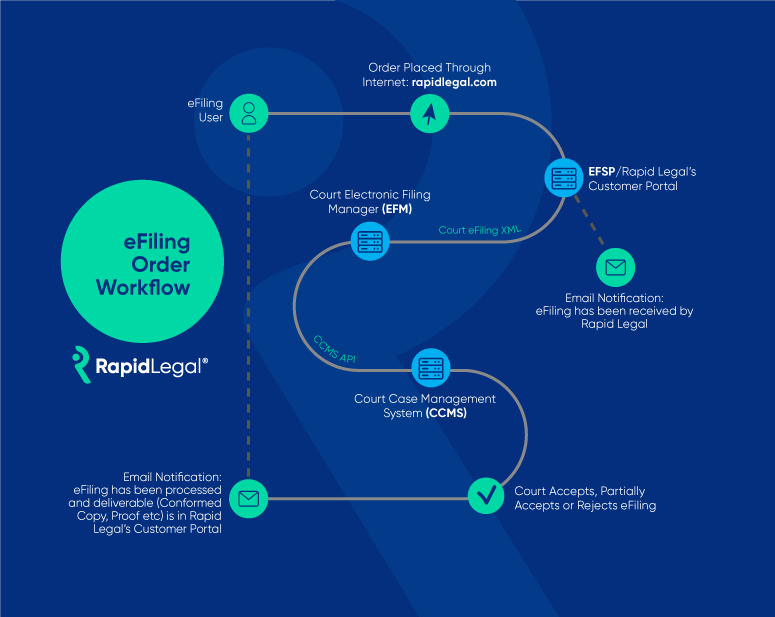There are many key stakeholders that are involved in the submission, transmission and completion of California court eFilings. As a certified Electronic Filing Service Provider (EFSP) for 39 California courts and counting, we examine the main stakeholders of the California Court eFiling system. Who are the players? What are their roles? And why are they important?
California Court eFiling Players and Roles
A high-level overview of a typical eFiling order workflow looks very similar to the image depicted below. We take a closer look at the stakeholders involved throughout the workflow and system.

Key Stakeholder 1: The eFiling User
An eFiling user is a user of the eFile case’s Electronic Filing Service Provider (EFSP) and typically places an order and/or submits the case. This person may be the case initiator or the point of contact throughout the life of the case. There could be many eFiling Users for one case. Examples of an eFiling user include Paralegal, Office administrator, Attorney, Secretary, Pro-pers, EFSP Operations user, EFSP customer, court runner, field agent, and more.
Stakeholder 2: Case Participants
A case will consist of case participants which are people, businesses, or organizations involved in the case. This usually consists of a plaintiff (a person who brings a case against another in a court of law) and a defendant (in a civil suit, the person complained against; in a criminal case the person accused of the crime).
Stakeholder 3: Electronic Filing Service Provider (EFSP)
As mentioned above, an eFiling user places an order via an Electronic Filing Service Provider (EFSP), which is a company whose online portal has been certified to transmit documents to a court via an integration with an Electronic Filing Manager (EFM), such as Tyler or Journal Technologies (JTI). In addition to providing eFiling services, an EFSP also typically provides value-added services, training, and support to eFiling users.
As a certified Electronic Filing Service Provider (EFSP) for over 36 courts, Rapid Legal’s technology is integrated with various court Electronic Filing Managers (EFM). These integrations enable filers to electronically file documents directly with the Court through Rapid Legal’s portal.

Stakeholder 4: Technology Provider of Electronic Filing Manager (EFM) Software
Next, the Electronic Filing Manager (EFM) acts as an intermediate system on the Court’s side. This is the system that receives the filings and processes them for the court clerks to view and manage. The EFM connects to the court’s Case Management System (CMS). All courts must use an EFM to manage their backend system.
Click here to view our handy guide that outlines which Court uses which EFM, whether it is mandatory or permissive, case types for eFiling, and associated costs.
Stakeholder 5: The Court and Case Management System (CMS)
Lastly, the stage following the EFM is the Court’s Case Management System (CMS). This is the Court’s backend system that automates court processes, monitors case activities, and supports decision-making through the use of real-time data and analytics. A case management system consolidates and maintains all the information that is pertinent to a case. Users of the court’s CMS include personnel such as clerks, judicial officers, and judges.
Reference Table: California Court eFiling Stakeholders
| Stakeholder | Definition | Notes | Examples |
|---|---|---|---|
| eFiling User | A User of the eFile case’s Electronic Filing Service Provider (EFSP) system. | This person may be the case initiator or the point of contact throughout the life of the case.There could be many eFiling Users for one case. | Paralegal, Office administrator, Attorney, Secretary, Pro-pers, EFSP Operations user, EFSP customer, court runner or field agent. |
| Case Participants | People, businesses, or organizations involved in the case; consisting of a plaintiff (a person who brings a case against another in a court of law) and the defendant (in a civil suit, the person complained against; in a criminal case the person accused of the crime). | Self-represented litigants are not required to eFile in California. | Plaintiff, Defendant, (or Attorney, if case participant is represented) |
| Electronic Filing Service Provider (EFSP) | A company whose online portal has been certified to submit documents to a court via an integration with an Electronic Filing Manager (EFM). | An ESFP may also provide value-added services, training, and support for eFiling. | Rapid Legal is an example of an EFSP. |
| Electronic Filing Manager (EFM) | The EFM acts as an intermediate system on the Court’s side. This is the system that takes in filings and processes them for the courthouse clerks to view.The EFM connects to the Court’s case management system (CMS). | All courts must use an electronic filing manager (EFM) to manage their backend system.One of these, in particular, requires filers to connect their Rapid Legal account to the EFM to help with proper tracking of cases, parties, and attorneys associated with cases. | Tyler (Odyssey eFileCA), Journal Technlogies (JTI), etc.California allows each county to select its own technology vendor.Click here to view our handy guide that outlines which Court uses which EFM. |
| Court Case Management System (CMS) | This is the Court’s backend system that automates Court processes, monitors case activities, and supports decision-making through the use of real-time data and analytics. | The stage following the EFM is the court Case Management System (CMS). After your filing has been accepted, your documents become a permanent part of the court record. A CMS helps to consolidate all the information that is pertinent to a case. The system also supplies all the tools that may be necessary for a follow up on the matter. | |
| Court | A government institution, with the authority to adjudicate legal disputes between parties and carry out the administration of justice in civil, criminal, and administrative matters in accordance with the rule of law. | Parties that work at the Court may include the clerk, judicial officer, and the judge. | Any courthouse, i.e.: LA County Superior Court, OC Superior Court, district courts, Court of appeals, etc. |
Looking to get started with eFiling? Check out our handy guide that provides an overview of eFiling, some common eFiling reasons to watch out for, a checklist of how to carefully select an Electronic Filing Service Provider (EFSP), and much more.
Ready to create an account? Place an eFile order today.
About Rapid Legal
For more than 25 years, Rapid Legal has helped to define and transform the legal support services industry with its vision and commitment to customers, the courts, and a party’s right to due process under the law.
Trusted by thousands of law firms, government agencies and companies, Rapid Legal leverages its deep industry and technology expertise, and a best-in-class legal services cloud management platform, LegalConnect®, for delivering premium legal support services including electronic filing of court documents (“eFiling”), physical court filings, and service of process.
